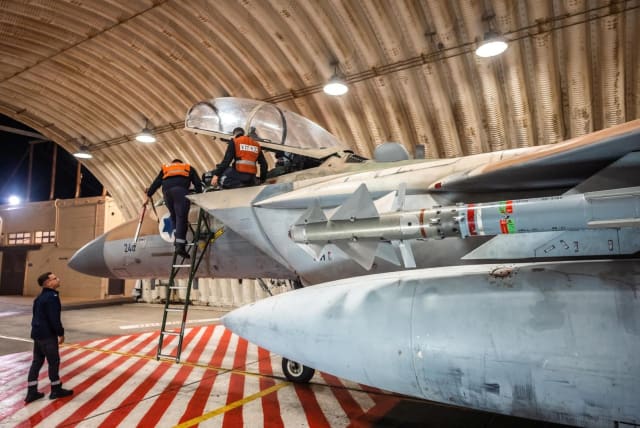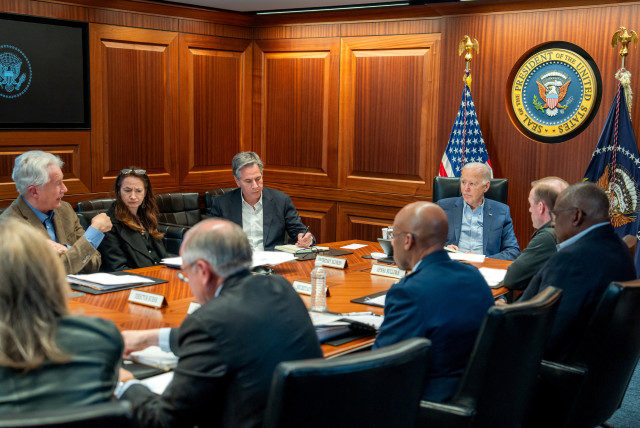A historic moment sheds light on historic opportunities - editorial

In light of Iran's historic attack, now is the time for Israel to re-strategize, build security in the region, and strengthening alliances.
‘Historic” is one of many words that can be used to describe the very early morning hours of April 14. A shadow war brought into the light and decades in the making has the potential to flip the Middle East on its axis. There is no question that Israel must respond, but the question is when, how, where, and what kind of backing will Jerusalem garner when this happens. These are the weighty considerations that the government and its leader face.
Iran’s missile barrage was unprecedented, both in its direct nature, in its quantity and in tonnage of TNT. It could have been cataclysmic.
The very impressive intercept rate – along with the mind-boggling cooperation of anti-extremism states with Israel – deserves a moment of reflection and pride.
A 99% intercept success rate is incredible, and the fact that many missiles and drones were shot down outside Israeli air space helped save lives, although one girl is severely hurt and is fighting for her life, and some material damage sustained.
In some ways, the highly successful interdiction in the early hours of Sunday managed to downplay some of the damage - diplomatic and military - sustained since Oct. 7.
We are proud and grateful to our allies for standing staunchly by us at this moment of great emergency. If there was any doubt if the criticism of Israel’s behavior in Gaza would bleed into support against an attempt at its annihilation, that concern was laid to rest, with the US, the UK, France, and others lending their aid and support.
These are not mutually exclusive, and calls are still being made to question or limit defense exports to Israel due to the Gaza war, but when push came to shove, our allies heeded the call – from the West and the anti-extremist Arab world – from both a sense of true allyship, and through pure pragmatism.
This divide was made clear by US President Joe Biden on Sunday, with the New York Times reporting, according to US officials, that alongside Biden’s staunch support is a hope that a larger escalation will be avoided by Israel choosing to take its impressive interception defense as victory against Iran, and not go on the offensive. The report said they considered Israel’s interception of the more than 300 drones and missiles to be a significant strategic victory that may not require further retaliation.
Israel's unique role in the world in retaining global support
This sentiment touches on a soft underbelly that contains the space that allows for Israel’s wiggle room to act while retaining the global support that the world saw on Saturday night and Sunday morning.
Biden was clear that the US would not participate in or countenance any Israeli action against Iran, the White House said. As a sovereign state, the choice, ultimately, will always be Israel’s, but that is not the question.
Of course, Israel could launch 300 missiles at Iran. But should it? That’s the question facing Netanyahu, as he weighs the cost and benefit of doing such a thing. Israel needs the Americans; that much is clear. US National Security Council Coordinator for Strategic Communications John Kirby told ABC’s “This Week” on Sunday that the US will continue to help Israel defend itself – but it does not want war with Iran.
“Our commitment is ironclad” to defending Israel and to “helping Israel defend itself… We don’t seek a wider war with Iran. We don’t seek escalated tensions in the region.”
Israel needs a proper strategy. We have the time, and now is not a time to be rash; it is a time to be strategic and smart. Lest anyone forget, we are in the middle of a war in Gaza. On Saturday night, Hamas rejected the hostage deal plan, leaving 133 captives in the throes of hell.
Minister Benny Gantz said it best: “Iran is a global problem, a regional challenge, and a danger to Israel, and yesterday, the world took a clear stance with Israel against this danger. The result is Israel, and the world, against Iran. This is the strategic victory that we must use to build up Israel’s security. But the fight isn’t over; this is precisely the time to strengthen the strategic alliances that we have, and the regional cooperation that we’ve built and that they should stand the test of time. Israel proved yesterday that it is an anchor of military and technological prowess, of security in the Middle East – all thanks to the IDF. We will build a local coalition against Iran and exact punishment from it, in the place and at the time that is correct for us.
Jerusalem Post Store
`; document.getElementById("linkPremium").innerHTML = cont; var divWithLink = document.getElementById("premium-link"); if (divWithLink !== null && divWithLink !== 'undefined') { divWithLink.style.border = "solid 1px #cb0f3e"; divWithLink.style.textAlign = "center"; divWithLink.style.marginBottom = "15px"; divWithLink.style.marginTop = "15px"; divWithLink.style.width = "100%"; divWithLink.style.backgroundColor = "#122952"; divWithLink.style.color = "#ffffff"; divWithLink.style.lineHeight = "1.5"; } } (function (v, i) { });

